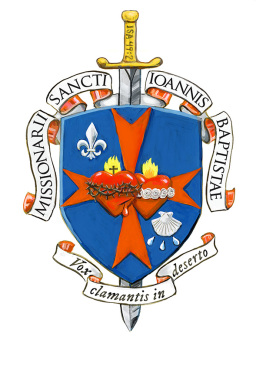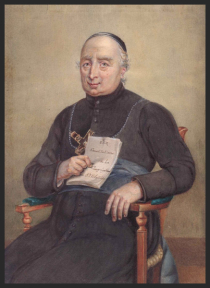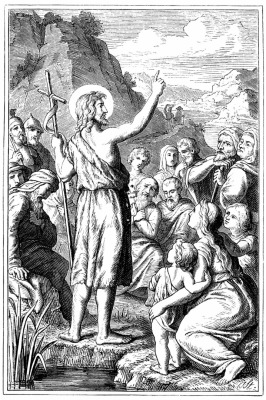About Us
After the suppression of their status as a public association, the purposes for which this private association (de facto) and stand alone non-profit civil corporation, the Missionaries of Saint John the Baptist (MSJB), exists:
(1) to strive, as indicated by the teaching of Perfectae Caritatis Vatican II (cf. no. 2), to imitate His Majesty, Jesus Christ, and their holy founder Fr. Jean Baptiste Rauzan (d. 1847). They will do as they did, and as their own bishop has recently instructed them: patiently to “pursue the life of contemplation and penance,” and “[t]here is nothing to prevent you as individuals from living and praying in common and continuing to seek Christian perfection together.” In a word, they strive to follow as closely as possible the spirit, writings, and written rule of Fr. Jean Baptiste Rauzan in order to remain faithful sons of the Holy Roman Catholic Church;
(2) to live in community in view of (1) in which common religious life is lived in a disciplined, traditional manner, including the celebration of the liturgy according to the usus antiquor of the Roman Rite, with the liturgical books of 1962 being normative;
(3) to maintain the patrimony and contracts of the MSJB now a private association (de facto; cf. cc. 215, 310) and stand alone non-profit civil incorporation;
(4) to build up the Body of Christ in the ways open to them (cf. Eph 4:12, 16 and Romans 14:19), such as maintaining a pious presence in the Church, maintaining their websites (e.g., cf. www.ourladyoflourdes.info), seeking further education of its members, and acting as instruments of Divine Providence in assisting priests and religious in distress;
(5) to do all things necessary and proper to carry out the intent and purpose of the MSJB as may be lawfully done under the law of the Catholic Church, the Statutes of the MSJB and civil law, including the disposition of property by lease, sale, exchange, transfer or otherwise.
MSJB Decree of Erection.pdf
Adobe Acrobat document [1.4 MB]
First Profession and Public Association
8933MESSENGEROCT112019.pdf
Adobe Acrobat document [1.8 MB]
9502MESSENGERJANUARY172025-Decree.pdf
Adobe Acrobat document [2.2 MB]
9502MESSENGERJANUARY172025-Letter.pdf
Adobe Acrobat document [540.8 KB]
An amazing impromptu speech (relavant to us even today) of the great Dominican theologian Banez defending the establishment of first Discalced Carmelite Monastery before the leaders of Avila:
"It may seem rash to oppose myself to so many and such grave persons, and to reasoning so well thought out. But if my own conscience gives assurance and puts me under obligation more than those of others in free discussions such as this, I cannot fail to declare what it dictates to me in favor of the new monastery of Discalced Carmelites. Free at least from passion shall be my testimony, for until this hour I have never spoken with nor met the Foundress, nor discussed her foundation in any way. The thing is new, I admit, and as such has produced the effects that innovation usually does among the multitude. But this is no reason why it should produce them in grave and prudent councils, for not every innovation is reprehensible. Were the other religious orders founded in any other way? Did not the reforms which we see every day, and which our ancestors saw, come to light when they were least though of? Was not the Christian Church itself reformed anew by Christ? Surely nothing in it, however excellent it may be, could be improved if we all surrendered to the cowardly fear of innovation. What is introduced for the greater glory of God and the reformation of customs ought not be called innovation or invention, but the renovation of virtue, which is always old. And if the trees are not new when they are seen in the spring, nor the sun when it rises each day, why will it be a blameworthy innovation in religious orders to renew themselves? Which is more reprehensible in them: to lose their ancient splendor or to recover it? If the first does not frighten us, why should the second scandalize us? That, gentlemen, is reprehensible innovation which opposes itself to virtue and the greater service of God. The Convent of Carmelites, recently founded is a restoration of what has been lost, to the great improvement of that holy Order, and the edification of the Christian people. And so on that score this convent ought rather to be favored, and especially by the heads of Christian republics, to whom it belongs to encourage such praiseworthy deeds. May many imitate her! Oh, how much praise would Avila deserve, and all our kingdoms and the whole Church, if we followed after this heroic virgin! I do not approve of the rash multiplication of religious orders. But it is not easy to determine when this is the case. For if vain and vicious men are not considered rash, however much they multiply themselves, why must those who follow the law of virtue be held and persecuted as such? The cities are full of lost people; these streets swarm with vagrant, insolent, and lazy men, with boys and girls even given over to vice; and none of this is considered rash, nor is there anyone who takes the trouble to remedy it -- and only four little nuns stowed in a corner, in a hole, commending themselves to God, are held to be a grave injury and intolerable burden to the Republic? And this disturbs and troubles the city, and there are assemblies to look into it? What is this, gentlemen; why do we gather here? What army of enemies breaks down these walls? What fire burns the city? What pestilence consumes it? What hunger afflicts it? What ruin threatens it? Are only four little barefoot nuns, poor, quiet, and virtuous, the cause of so much commotion in Avila? Allow me to say that the prestige of a city so important seems less when it holds so solemn a meeting and convocation for so light a reason.
"I confess that I do not think this foundation should be made without an income; not so much on account of the burden thus resulting to the city, for it is very light, as on account of the inconvenience to the religious themselves, who, enclosed without secure provision, are likely to suffer need. I cannot deny that it pertains to the providence of cities to prevent the mischiefs which can ensue, but that has to do with secular affairs. As for those which by right are ecclesiastic, it is the province of the Bishop to look into them; and if convents are founded by his command, it is for him to arrange them. This new one was established with the knowledge and advice fo the Bishop, and what is more, by an especial Brief of the Apostolic See. And so it is wholly outside the secular jurisdiction. And finally, gentlemen and fathers of ours, I cannot in any way agree that the monastery be disestablished by order of the city; but that if there be anything against it, and if it be fitting to undo it, the Lord Bishop, to whom it belonged to establish it, should be informed and consulted."
Explanation of Our Shield
-
The shield is for battle in the Lord’s army and is blue for Our Lady of Victories.
-
The Sacred and Immaculate Hearts at the center show how the whole world needs to have them for its focus. All the arrows of the cross point inward to them! Without them man is lost! Thus, as they have asked of us, we must give them everything in a total consecration and spend our lives in dedication to them... as the very center of counter-revolution!
- The shell is for baptism when we first received the armor of God as members of the Church Militant on earth. It also stresses the importance of St. John the Baptist as the forerunner of Christ.
- Three drops of water for the Most Holy Trinity as well as the three vows of poverty, chastity and obedience (which act as a second baptism for religious), and the virtues of faith, hope and charity (given at baptism).
- The fleur-de-lys is for Our Lady and for France, the country of our founder, Fr. Jean Baptiste Rauzan (d. 1847), as well as the purity of heart needed for religious and sound preaching.
- The Cross is that of St. John the Baptist, being red for his martyrdom.
- The sword is for preaching, referring to the saying from Isaias 49:2 “And he hath made my mouth like a sharp sword.”
- The motto of the Missionaries is that of St. John the Baptist: “A voice of one crying in the desert, prepare ye the way of the Lord” (Matt. 3:3).
A Little History
This private association of the faithful (de facto), officially recognized as the Missionaries of Saint John the Baptist (MSJB), stems from the spiritual legacy of the Congregation of the Priests of Mercy, which was originally founded at Lyon, France, in 1808, by the Very Reverend, Jean Baptiste Rauzan, a zealous priest of Bordeaux. Fr. Rauzan noted that after the great upheaval which the Church suffered in France during the Revolution, the clergy and people sought from heaven extraordinary ways to foster the salvation of souls. Many ways were employed to revitalize the faith. A congregation of missionaries was desired which would be at the call of their excellencies, the bishops. Consequently, Archbishop Joseph Cardianal Fesch, requested that Fr. Rauzan found such a missionary society first at Lyons under the Empire in 1808, and organized at Paris during the first days of the Restoration in 1814. These first Missionaries of France received, without difficulty, the privileges of a legally constituted society. Of note for the MSJB as spiritual sons of Fr. Rauzan is how their holy and dedicated founder was exiled or sidelined, if you will, no less that four times, on each occasion in good standing. During these times, he kept up his good spirits, ever trusting in Divine Providence.
On February 18, 1834, Pope Gregory XVI, of holy memory, established and erected this little band of missionaries as a pontifical society under the title of the Priests of Mercy of the Immaculate Conception of the Blessed Virgin Mary. By 1961, the Holy See fulfilled the long held desire of Fr. Rauzan by further elevating the institute to a full religious congregation with the members adding the public vow of poverty to that of chastity and obedience.
In the aftermath of the Second Vatican Council, mitigations in religious discipline and liturgical revisions were observed in many institutes that caused some religious to seek restoration. Two members of the Congregation of the Priests of Mercy, inspired by various papal documents and exhortations calling for reform, sought permission to establish a new institute that would not only embrace a more rigorous consecrated life, but would also employ all the Sacraments according to their usus antiquior. The superior and the council of the congregation, as well as the Bishop of Covington, Kentucky, Roger J. Foys, agreed to this new foundation.
The Missionaries of Saint John the Baptist seek to maintain the spiritual and liturgical patrimony left to them by Fr. Jean Baptiste Rauzan, including making use of much of his original rule. The same revolutionary errors he confronted and corrected are now fully entrenched in the modern world. Like the great Precursor of our Lord, therefore, we, too, are a voice crying in the wilderness, preparing the way of the Lord and making straight His paths (Isaias 40:30), so that all things may be restored in Christ the King. Such counter-revolutionary work within ourselves, within our community, within the membership of Holy Church, and within society in general, however, is tempered by modern man's need for the Mercy of God. Since our dearest Lord came not to condemn the world but to save the world (John 12:47), we look to imitate the methods of the greatest of Prophets and Fr. Rauzan who were sent to turn the heart of the fathers to their children and the heart of the children to their fathers: lest (God) come and strike the earth with anathema (Malachias 4:6).






